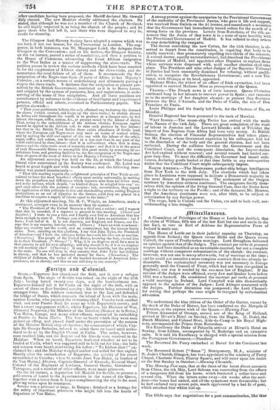SCOTLAND.
The nomination of a candidate for the representation of Ayrsbire, in the room of Lord Kelburne, who has succeeded to the Earldom of Glas- gow, took place at Ayr on the 3d instant. Captain Blair, of Blair, pro- posed that Mr. Alexander Oswald should be elected as representative for the county ; and Mr. Bartlemore of Seabrae seconded the motion. No
other candidate having been proposed, the Sheriff declared Mr. Oswald ' duly elected. The new Member shortly addressed the electors. He stated, that although he was not a member of the Church of Scotland, he still highly respected it, as being the church of the people ; and he gave those who had left it, and those who were disposed to stay in, credit for sincerity.
The Glasgow Anti-Slavery Society have adopted a course which was too bold, if not too honest, for the Convention in London. The sug- gester, in both instances, was Mr. Macgregor Laird, the delegate from Glasgow to the Convention ; and on his motion, the Glasgow Society, on the 1st instant, passed a series of resolutiacs, and then a petition to the House of Commons, advocating the freest African emigration to the West Indies as a means of suppressing the slave-trade. The petition passes in review the various methods which have been resorted to for the suppression of African slavery and the slave-trade, and de- monstrates the total failure of all of them. It recommeeds the free emigration of the Negro race from all parts of Africa to her Majesty's Colonies , as a certain means of undermining and ultimately putting a stop to the slave-trade. It declares that the emigration at present per- mitted by the British Government, restricted as it is to Sierra Leone, and crippled by the system of passports, fees, and registrations, is unde- serving of the name of free emigration. And all these positions are corroborated by reference to the evidence of intelligent and experienced persons, official and others, contained in Parliamentary papers. The petition showeth-
" That your petitioners believe, the only effectual way to destroy the demand for slaves, (which created, and keeps up the slave-trade,) to abolish slavery in Africa and throughout the world, is to produce at a cheaper rate, by free labour, the sugar, coffee, cotton, &c., at present raised by the labour of slaves. Tbat, owing to the unhealthiness of the African climate, European capital cannot be applied to the African soil, to raise snch produce by free labour ; but that in the British 'West Indies there exists abundance of fertile land, where the European and Negro races may meet on terms of mutual safety, and by uniting the skill and capital of the one with the labour of the other, sugar, coffee, and cotton, can be raised at a less cost than in any part of the world cultivated by slave-labour : that it is self-evident, when that is done, slavery and the slave-trade must of necessity cease : and that it is in the power of your Honourable House to accomplish this great result, by removing all re- strictions from, and granting facilities to, the free emigration of the Negro race from all parts of the coast of Africa to her Majesty's Colonies."
An adjourned meeting was held on the 2d, at which the broad and liberal view entertained by the Society was confirmed. Mr. Laird was heard at great length and with much interest ; and the following reso- lution was passed unanimously-
" That this meeting regards the enlightened principles of Free Trade as cal- culated to have the most beneficial effects upon society universally, in melting down the prejudices and differences which separate man from his fellow man, and make nations, which should, ' as kindred drops, be mingled into one,' re- gard each other with the jealousy of enemies: but, nevertheless, they regard the application of this principle to free and slaveholding states, raising Tropical productions, as an act of injustice to the former, until they are placed in a condition to acquire a supply of labour equal to the latter."
At this adjourned meeting, Mr. H. C. Wright, an American, made a statement, stranger even in its manner than its matter-
" The President of the United States is a thief and a robber; and I request that this be recorded, if a reporter is present in this meeting. (Cheers and laughter.) I state to you a fact, and I hardly ever find an American that has brass enough to state it. Perhaps you will think I have no patriotism : but I have; I am full of it. It is not America, nor England, nor France, nor Eu- rope that is my country, but the world. (Cheers.) I have no wish to acknow- ledge any country but the world, and no countrymen but the human family alone. Now, standing on this platform, I say that John Tyler, the President of America—and I have the evidence before me—sold his own son at auction. (Sensation.) The people of the United States, knowing the fact, elected him
to be their President. Shame! ") Why, it is no disgrace at all for a man in that country to sell his own offspring ; and why should it be, if it is no disgrace to sell anybody else ? (Cheering.) It may be more horrible, but the principle is the same. No one will deny in that country that John Tyler has children in slavery, and that he has pocketed money for them. (Sensation.) The children of Jefferson, the writer of the boasted document of American Inde- pendence, are in slavery, and this no one will deny in our country."



























 Previous page
Previous page